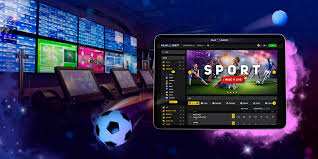The Impact of 5G on Technological Advancement and Daily Life

The Impact of 5G on Technological Advancement and Daily Life
The rollout of 5G technology is not just an incremental upgrade; it is a transformative leap that promises to reshape various aspects of life and industry. The enhanced capabilities of 5G networks—including faster speeds, lower latency, and greater connectivity—set the stage for significant advancements across numerous sectors. As we delve into the implications of 5G, we will also consider practical applications that are already emerging. In this expanding digital landscape, platforms like The Impact of 5G on Online Casino Games bet winner app are beginning to utilize 5G capabilities, enabling quicker data processing and real-time interaction like never before.
The most immediate impact of 5G is on communication. With speeds reaching up to 20 Gbps, 5G enables seamless video conferencing, high-quality live streaming, and instantaneous file sharing. This is particularly relevant in a world that has come to rely heavily on remote communication due to circumstances like the COVID-19 pandemic. The improved network reliability means that businesses can rely on real-time communication without interruptions, leading to enhanced productivity and collaboration.
Transforming Industries
The potential applications of 5G span a multitude of sectors, including healthcare, transportation, education, and entertainment. In healthcare, for instance, 5G can facilitate remote surgery. Surgeons equipped with virtual reality tools can operate on patients thousands of miles away, a feat made possible by the low latency of 5G networks. This innovation not only makes healthcare more accessible but also enhances the ability to respond to emergencies in various environments.
Similarly, in transportation, the development of connected and autonomous vehicles is significantly influenced by 5G technology. Vehicles that communicate with each other and with infrastructure can significantly reduce the risk of accidents, optimize traffic flows, and improve fuel efficiency. Smart traffic systems that adapt to real-time conditions can lead to smarter, more efficient urban environments.

Enhancing User Experience
For consumers, 5G promises an enhanced experience across various digital platforms. The rise of augmented reality (AR) and virtual reality (VR) applications powered by 5G enables immersive gaming, shopping, and educational experiences. For instance, AR applications can superimpose digital information onto the physical world, transforming the retail landscape by allowing customers to visualize products in their home settings before making a purchase.
The entertainment industry is also benefiting from 5G technology, with streaming services offering higher resolutions, including 4K and even 8K content. This advancement allows for an enriched viewing experience that can be enjoyed on mobile devices without buffering—a crucial factor as more people opt for streaming content on the go.
Smart Cities and IoT
5G will act as the backbone for the Internet of Things (IoT), facilitating the connection of millions of devices. Smart cities, for instance, will rely on an interconnected network of sensors and devices to manage everything from electricity usage to waste management effectively. This level of connectivity will allow for real-time data collection and analysis, leading to more efficient urban planning and resource allocation.
Furthermore, with 5G, smart homes will become more sophisticated. Home appliances can communicate with each other and the users, making living more convenient and efficient. From refrigerators that track food expiration dates to thermostats that learn your schedule and adjust temperatures accordingly, the possibilities are virtually limitless.

Challenges and Considerations
While the potential benefits of 5G are vast, there are challenges to be addressed. One of the primary concerns is the infrastructure required to support 5G technology. The transition from 4G to 5G involves substantial investments in new antennas and equipment. Many rural areas may lag behind urban centers, widening the digital divide if infrastructure isn’t prioritized equitably.
Moreover, privacy and security concerns are paramount. With more devices connected to the internet than ever before, the potential for data breaches increases significantly. Industry stakeholders must prioritize security protocols to safeguard sensitive information as more personal data is transmitted over these networks.
The Future of 5G
Looking ahead, the full potential of 5G is still unfolding. As industries adopt this technology, new applications will emerge, leading to innovative solutions that we cannot yet predict. The integration of AI and machine learning with 5G capabilities can drive smarter, faster decision-making across various sectors.
As 5G continues to roll out globally, it will be crucial for policymakers, businesses, and consumers to work collaboratively to harness its potential while addressing the challenges it poses. The future presents a landscape filled with opportunities for growth and innovation, but it will require a concerted effort to ensure that these advancements benefit all of society.
In conclusion, the impact of 5G on technological advancement and daily life is profound. It holds the key to unlocking new possibilities across multiple sectors, enhancing communication, fostering innovation, and shaping a more connected future. The journey to a fully integrated 5G world is just beginning, paving the way for a profound transformation in how we live, work, and interact.




















